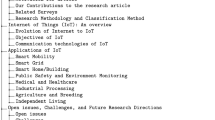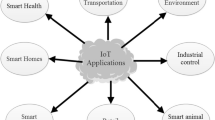Abstract
Clock synchronization provides fundamental timing reference for various services in the Internet of Things. Unlike centralized synchronization algorithm, which relies heavily on the synchronization routing and brings about error accumulation consequently, the distributed synchronization algorithm achieves clock synchronization through time message exchange and calculation among adjacent nodes, hence the error accumulation can be greatly eliminated. However, the convergence speed of existing distributed synchronization algorithms is generally slow, and network topology information is seldom utilized to improve the convergence speed, which may cause additional energy consumption, especially in resource-constrained scenarios. To improve the convergence speed of distributed clock synchronization, a consensus tracking-based clock synchronization (CTCS) algorithm is proposed in this paper. By analyzing the synchronization process in the state space framework, the convergence acceleration term is designed to optimize the eigenvalue distribution of synchronization error matrix, hence the convergence speed can be greatly improved. To be suitable for clock synchronization in the dynamic network, a reference clock input term is designed in the clock update formula, which eliminates the oscillation of synchronized clocks triggered by synchronization of newly joined nodes. To prove the convergence of CTCS, an in-depth analysis of the algorithm is conducted. Both simulation and experimental results validate the effectiveness of CTCS in comparison with other solutions.














Similar content being viewed by others
References
Akhlaq M, Sheltami TR (2013) RTSP: an accurate and energy-efficient protocol for clock synchronization in WSNs. IEEE T Instrum Meas 62(3):578–589
Brogan WL (1991) Modern control theory. Pearson education, pp 323–325
Bu X, Hou Z, Zhang H (2017) Data-driven multiagent systems consensus tracking using model free adaptive control. IEEE T Neur Net Lear 29(5):1514–1524
Choi BJ, Liang H, Shen X (2011) DCS: Distributed asynchronous clock synchronization in delay tolerant networks. IEEE T Parall Distr 23(3):491–504
Elson J, Girod L, Estrin D (2002) Fine-grained network time synchronization using reference broadcasts. ACM SIGOPS Oper Syst Rev 36:147–163
Franklin GF, Powell JD, Emami-Naeini A (2015) Feedback control of dynamic systems. Pearson, London, pp 123–126
Ganeriwal S, Kumar R, Srivastava MB (2003) Timing-sync protocol for sensor networks. In: Proceedings of the 1st international conference on Embedded networked sensor systems, pp 138–149
Hamilton BR, Ma X, Zhao Q (2008) ACES: adaptive clock estimation and synchronization using Kalman filtering. In: Proceedings of the 14th ACM international conference on Mobile computing and networking 152–162
He J, Cheng P, Shi L (2014a) Time synchronization in WSNs: a maximum-value-based consensus approach. IEEE T Automat Contr 59(3):7882–7887
He J, Li H, Chen J (2014b) Study of consensus-based time synchronization in wireless sensor networks. ISA T 53(2):347–357
Horn RA, Johnson CR (2012) Matrix analysis. Cambridge university press, pp 135–136
Jia P, Wang X, Zheng K (2019) Distributed clock synchronization based on intelligent clustering in local area industrial IoT systems. IEEE T Ind Inform 16(6):3697–3707
Jia P, Wang X, Shen X (2020) Digital twin enabled intelligent distributed clock synchronization in industrial iot systems. IEEE Internet Things 8(6):4548–4559
Kadowaki Y, Ishii H (2014) Event-based distributed clock synchronization for wireless sensor networks. IEEE T Automat Contr 60(8):2266–2271
Lamonaca F, Gasparri A, Garone E et al (2014) Clock synchronization in wireless sensor network with selective convergence rate for event driven measurement applications. IEEE T Instrum Meas 63(9):2279–2287
Leng M, Wu Y-C (2011) Low-complexity maximum-likelihood estimator for clock synchronization of wireless sensor nodes under exponential delays. IEEE T Signal Proces 59(10):4860–4870
Maggs MK, O’keefe SG, Thiel DV (2012) Consensus clock synchronization for wireless sensor networks. IEEE Sens J 12(6):2269–2277
Manavalan E, Jayakrishna K (2019) A review of Internet of Things (IoT) embedded sustainable supply chain for industry 4.0 requirements. Comput Ind Eng 127:925–953
Noh KL, Chaudhari QM, Serpedin E et al (2007) Novel clock phase offset and skew estimation using two-way timing message exchanges for wireless sensor networks. IEEE T Commun 55(4):766–777
Olfati-Saber R, Fax JA, Murray RM (2007) Consensus and cooperation in networked multi-agent systems. Proc IEEE 95:215–233
Phan LA, Kim T (2020) Fast consensus-based time synchronization protocol using virtual topology for wireless sensor networks. IEEE Internet Things 8(9):7485–7496
Schenato L, Gamba G (2007) A distributed consensus protocol for clock synchronization in wireless sensor network. In: IEEE conference on decision and control, IEEE, pp 2289–2294
Schenato L, Fiorentin F (2011) Average timesynch: a consensus-based protocol for clock synchronization in wireless sensor networks. Automatica 47(9):1878–1886
Shi F, Tuo X, Ran L (2019) Fast Convergence time synchronization in wireless sensor networks based on average consensus. IEEE T Ind Inform 16(2):1120–1129
Su W, Akyildiz IF (2005) Time-diffusion synchronization protocol for wireless sensor networks. IEEE/ACM Trans Netw 13(2):384–397
Swain AR, Hansdah RC (2015) A model for the classification and survey of clock synchronization protocols in WSNs. Ad Hoc Netw 27:219–241
Tahaei H, Afifi F, Asemi A et al (2020) The rise of traffic classification in IoT networks: a survey. J Netw Comput Appl 154:1–20
Wang H, Shao L, Li M et al (2017b) Estimation of frequency offset for time synchronization with immediate clock adjustment in multihop wireless sensor networks. IEEE Internet Things 4(6):2239–2246
Wang Z, Zeng P, Zhou M (2017c) Cluster-based maximum consensus time synchronization for industrial wireless sensor networks. Sensors-Basel 17(1):1–16
Wu J, Zhang L, Bai Y (2014) Cluster-based consensus time synchronization for wireless sensor networks. IEEE Sens J 15(3):1404–1413
Wu J, Bai Y, Zhang L (2015) Distributed time synchronization in wireless sensor networks via second-order consensus algorithms. J T Univ 21(2):113–121
Xiong Y, Wu N, Shen Y et al (2017) Cooperative network synchronization: asymptotic analysis. IEEE T Signal Proces 66(3):757–772
Yang S, Tan S, Xu J-X (2013) Consensus based approach for economic dispatch problem in a smart grid. IEEE T Power Syst 28(4):4416–4426
Yildirim KS, Kantarci A (2013) Time synchronization based on slow-flooding in wireless sensor networks. IEEE T Parall Distr 25(1):244–253
Yin X, Yue D, Hu S (2013) Consensus of fractional-order heterogeneous multi-agent systems. IET Control Theory A 7(2):314–322
Zhang X, Chen H, Lin K et al (2019) RMTS: a robust clock synchronization scheme for wireless sensor networks. J Netw Comput Appl 135:1–10
Zhang X-D (2017) Matrix analysis and applications. Cambridge University Press, pp 48–49
Zhou F, Wang Q, Han G (2019) APE-sync: an adaptive power efficient time synchronization for mobile underwater sensor networks. IEEE Access 7:52379–52389
Funding
This work was supported in part by National Key Research and Development Program of China under Grant 2017YFE0132100, and in part by National Natural Science Foundation of China under Grant 61971305.
Author information
Authors and Affiliations
Contributions
Conceptualization, YN and TY; Methodology YN; Software YN, WL; Validation TY and YN; Formal Analysis, YN, TY and ZH; Investigation, YN; Resources, YN and SC; Data Curation, PY and YN; Writing-Original Draft Preparation, YN; Writing-Review & Editing, YN, TY and WL; Visualization, YN; Supervision, TY; Project Administration, TY.
Corresponding author
Ethics declarations
Conflict of interest
The authors declare no conflicts of interest.
Ethical approval
This article does not contain any studies with human participants or animals performed by any of the authors.
Informed consent
Informed consent was obtained from all individual participants included in the study.
Additional information
Publisher's Note
Springer Nature remains neutral with regard to jurisdictional claims in published maps and institutional affiliations.
Rights and permissions
About this article
Cite this article
Niu, Y., Yang, T., Hou, Y. et al. Consensus tracking-based clock synchronization for the Internet of Things. Soft Comput 26, 6415–6428 (2022). https://doi.org/10.1007/s00500-022-07165-x
Accepted:
Published:
Issue Date:
DOI: https://doi.org/10.1007/s00500-022-07165-x




